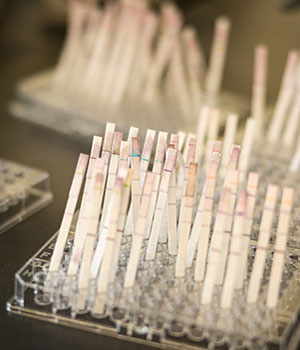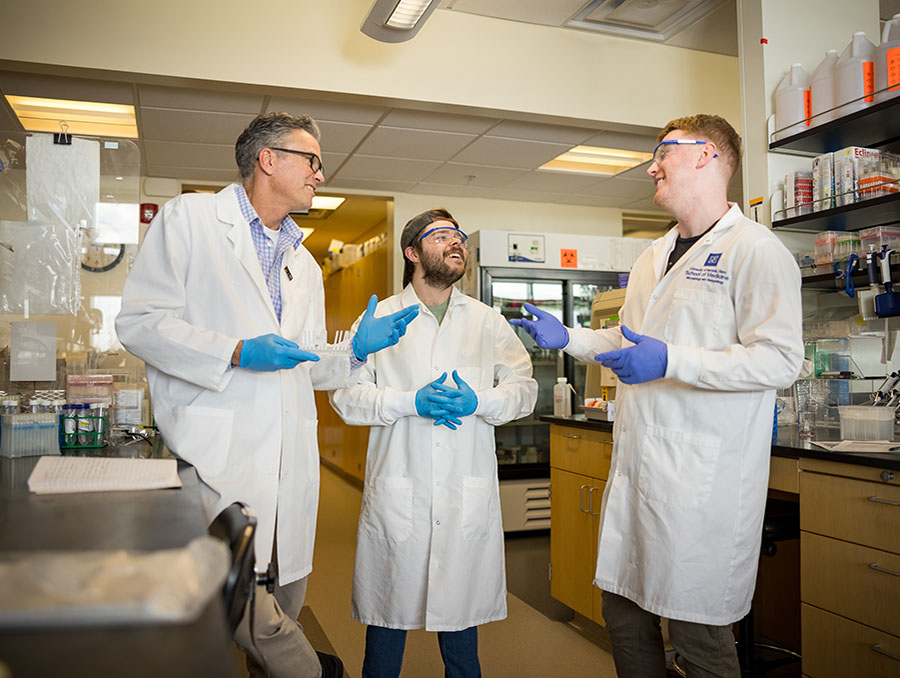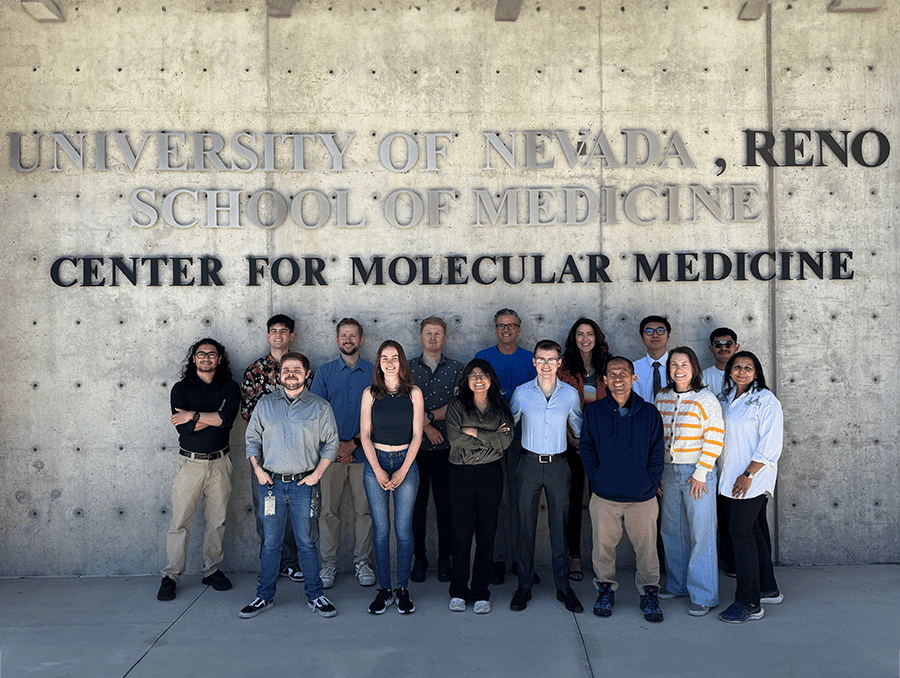David AuCoin, Ph.D., professor and chair of Microbiology and Immunology at the University of Nevada, Reno School of Medicine (UNR Med), leads a team in his lab that is developing rapid diagnostic tests to transform how infectious diseases are detected, particularly in underserved regions. His work aims to improve global health by creating fast, reliable and accessible testing solutions.
Transforming diagnostics for global health
 The AuCoin Lab is developing rapid diagnostic tests.
The AuCoin Lab is developing rapid diagnostic tests.The AuCoin lab develops rapid diagnostic tests for infectious diseases using lateral flowAuc immunoassays — similar to home pregnancy or COVID-19 tests. The process begins by identifying the best target antigen from the bacteria, virus, or parasite. AuCoin added, “Once we determine this, we develop antibodies; which are immune molecules, that can bind and detect these targets.”
Since the COVID-19 pandemic, people have become more comfortable with home use rapid tests. Rapid tests have been available for illnesses like the flu, RSV, strep, and COVID-19, but many other infections could still benefit from faster diagnosis if similar tests existed. The lab is currently developing tests for Lyme disease, viral hepatitis, syphilis and other infectious diseases.
“More importantly, these rapid tests are inexpensive, and some can be very accurate,” AuCoin mentioned. “Therefore, they are ideal to use in countries or regions with limited resources like Africa or Southeast Asia.”
Tackling global health challenges
A major project in the AuCoin Lab focuses on diagnosing Guinea-worm disease, caused by Dracunculus medinensis, a parasite that can be transmitted from dogs to humans.
In humans, Guinea-worm disease, results in the production of a very large parasitic worm that grows in the body. Eventually the worm emerges from the skin, causing painful blisters that can become seriously infected. Often, the worm grows in joints resulting in severe debilitation.
“Our team is focused on developing a more accurate diagnostic test first for dogs and potentially for humans as cases arise,” AuCoin said. Detecting infections in dogs allows for their isolation and treatment, helping prevent the parasite from contaminating water sources and spreading to humans.
Cutting-edge technology and collaboration
A key component of the project is obtaining tested blood samples from both infected and uninfected dogs in Africa. As part of the analysis, the AuCoin Lab works closely with the Mick Hitchcock Proteomics Center at the University of Nevada, Reno, which plays a vital role in processing patient samples.
“With these samples we can access the performance of any new tests that we develop,” said AuCoin. Testing blood samples from infected and uninfected dogs in Africa is key to evaluating the new tests. “The goal will be to identify greater than 95% of the infected dogs with our novel tests,” AuCoin explained. “We want to avoid false positives, so greater than 95% of uninfected dogs should test negative.”
 The AuCoin lab develops rapid diagnostic tests for infectious diseases using lateral flowAuc immunoassays.
The AuCoin lab develops rapid diagnostic tests for infectious diseases using lateral flowAuc immunoassays.Collaboration for greater impact
It’s also notable to mention that the AuCoin’s research thrives through partnerships. The Carter Center, founded by former U.S. President Jimmy Carter to promote global freedom and health, collaborates with African health ministries on the Guinea Worm Eradication Program (GWEP) and funds research initiatives in the U.S. and Africa, including the AuCoin Lab.
The amount of human Guinea worm disease cases decreased from approximately 3.5 million cases to 54 cases between 1986 and 2019. However, the Guinea -worm disease in dogs is still common in regions of Africa such as Chad, a major roadblock to the goal of global eradication. “Basically, parasites are shed by dogs into water supplies that can ultimately result in increased infections in humans,.” AuCoin explained.
For the Guinea worm disease project, his team also collaborates with Northern Arizona University, where Principal Investigator Jason Sahl, Ph.D., leads microbial genomic analysis. “Dr. Sahl has extensive expertise in microbial genomic analysis that is essential for the project,” AuCoin mentioned.
AuCoin’s research, in partnership with the Carter Center and Northern Arizona University, is key to tackling the challenge of animal transmission in the final stages of Guinea worm eradication. With continued global support, his work brings us closer to a safer world for all.
















